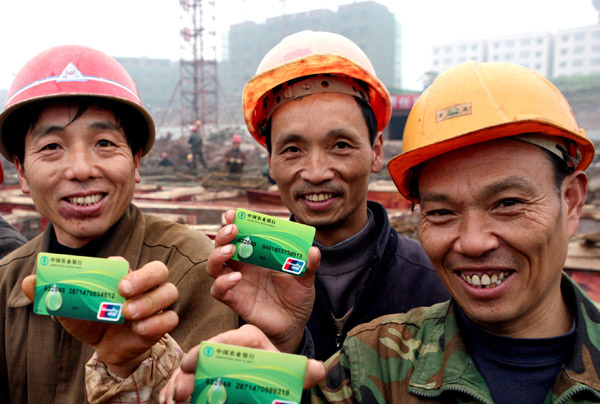Help is at hand for migrant workers
China's top trade union organization launched a program on Tuesday to make sure migrant workers are paid on time during the upcoming New Year and Spring Festival holidays and to provide relief services for needy workers.
 |
|
Migrant workers at a construction site in Huaying city of Sichuan province display their wage cards on Dec 14. |
"Migrant workers should enjoy the basic right of being paid for their labor," Li Shouzhen, spokesman for the All-China Federation of Trade Unions (ACFTU), said on Monday.
"Trade union federations across the nation will cooperate with local labor and public security departments to conduct strict inspections of companies to ensure they do not delay workers' payments."
Labor disputes have been increasing nationwide this year. Many employers have beaten workers who seek back pay.
The most recent case occurred when 40 "hatchet men" were sent by the boss of six construction workers to beat the workers when they requested payment of their late wages in Shanghai on Sunday.
Li said labor disputes usually surge ahead of the year's end, which is a peak time for migrant workers to settle wages.
"We'll ask local federations to strengthen mediation efforts and improve the handling of cases in which prosecution is necessary," he said.
Federations are being asked to provide policy and law consultation services, and to organize lectures to workers in labor-intensive sectors to educate them about how they can protect their rights, Li said.
"We'll ask local union organizations to use special funds to pay part of workers' earnings if employers face difficulties paying overdue wages," he added.
Many parts of the country have introduced initiatives to ensure workers are paid in full and on time.
In Harbin, capital of Heilongjiang province, local labor authorities have opened seven hotlines for migrant workers to report overdue wages or unreasonable paycheck deductions.
East China's Fujian province has also strengthened supervision over enterprises that have delayed wage payments and will put their names in the central bank's credit system to freeze lending to them.
Another component of the program calls for the ACFTU to assist migrant workers obtain train, bus and flight tickets to return home before the Spring Festival, which falls on Feb 3, 2011. It is typically difficult to get tickets around the holiday, when hundreds of millions of people rush home for family reunions.
"We will go to construction sites and enterprises to find out how many workers need tickets and where they're heading," the ACFTU's social security department director Zou Zhen said.
Zou said the ACFTU will report the figures to local transport departments and, for convenience, set up temporary ticket windows at places of work.
"Trains, buses and flights will also be chartered to ensure migrant workers can satisfy their needs to return home," he said, adding that workers will also receive ticket subsidies.
Over the holidays between 2007 and 2010, about 1,180 trains and 150,000 buses were chartered to transport migrant workers home. In addition, 530 million yuan ($80 million) in ticket subsidies were granted to migrant workers during the period, the official said.
The program will also extend beyond migrant workers to assist low-income families.
"This year's hike in consumer prices and frequent natural disasters have created many needy workers and families who are suffering," ACFTU Vice-Chairman Wang Yupu said.
He said urban China has about 4.48 million needy households.
"To relieve the pressure on low-income families, we will raise relief standards."
 0
0 






